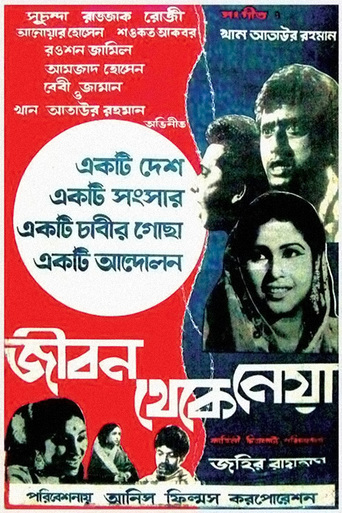

A Disappointing Continuation
... View MoreThis movie was so-so. It had it's moments, but wasn't the greatest.
... View MoreI really wanted to like this movie. I feel terribly cynical trashing it, and that's why I'm giving it a middling 5. Actually, I'm giving it a 5 because there were some superb performances.
... View MoreStory: It's very simple but honestly that is fine.
... View MoreGreat movie with all the metaphor, unique in it's genre in bengali movie. I have watched it and enjoyed it. But there's one thing that is quite sad is that the screen quality is not that great. But, all in all it covers up the gap with the superior story. I would recommend anyone to watch this movie to understand the prospect of Bengal Language Movement and the reason behind International Mother Language Day. I bet you would enjoy it.
... View More"Jibon Theke Neya" is political satire on the dictatorship of Ayub Khan in then East Pakistan. This film portrays Bengali Language Movement of 1952 and tribute to the Martyrs of the movement. The story presents dominating image of a woman in a family consisting her husband, two brother and the servants. This symbolizes the dictatorship of Ayub Khan in the country then. It also represents mass uprising of 1969 and arresting the political workers. Protest both outside in the road and inside in the house goes on. Meanwhile, the family members acquire courage to get rid of the dictatorship but another circumstance arises to gain control over the family and possession of a bunch of keys.Prominent Director of Bangladeshi film, Zahir Raihan symbolizes the family as the country, and possession of the bunch of keys as the political movement in the film. The story was written with great care to portray the incidents of political movement metaphorically. All of the cast of the film have done tremendous acting. In this film, several prominent songs such as "Amar Bhaiyer Rokte Rangano", song based on Language Movement, "Karar Oi Louho Kopat", song written by rebel poet Kazi Nazrul Islam and "Amar Sonar Bangla" which was later taken as the National Anthem of Bangladesh was used. It is said that this film inspires Liberation War in 1971 and the songs were inspiration for the freedom fighters. For all type of audience, this can be a worth watching film. Audience can have knowledge about 1952's Language Movement, 1969's mass uprising from this classical one of Zahir Raihan.
... View MoreIt happens to be the one and only movie, which is based on movement of Bengali Mother Language right. It is a blend of great plot and awesome acting. It have bit of comedy and drama. You will find out how the Bengal people fight for the right to talk in their mother language. How people suffer against Pakistani military government, who tries to enforce Urdu language on Bengali people. In the parallel plot it shows family politics where the elder lady wants to control the whole family. She tricks the two sister so well that they starts fighting thus she get the control back to her hand. There are few legendary songs on the movie, one of them is the National Anthem on Bangladesh and another one is popular. It is said this songs were big inspiration in the liberation period, Mukti Jodha's use to listen the songs for hours which inspires them to fight for their freedom. Its a must watch for all those who wants to know about Bangladesh.
... View More"Jibon Theke Neya" is a timeless classic directed by one of most potential directors of Bangladesh Zahir Raihan. It tells story of Bangladesh under Pakistani dictatorial rules in the 70's metaphorically. Zahir Raihan took a bold step to portray the political movements in the then East Pakistan with this movie. Inspired by events surrounding the mass uprising of 1969, the movie was released prior to the war but still represents the true spirit of independence. In this movie the National Anthem of Bangladesh,"Amar Shonar Bangla Ami Tomay Bhalobashi" was played for the first time. The song was not only used as the National Anthem but also was able to generate the sense of Bengali nationalism among the masses. The lyrics of the song that was sung inside the jail captured in the movie too will make clear how motivational it was. It is summarized like this 'break that lock, break that iron gate of jail, fire on the jails and release all victims'. So it is not only a movie to be picture of the socio-political scenario but proved to be an effective catalyst in bringing about the people of East Pakistan under the same banner that demanded independence and autonomy.
... View More